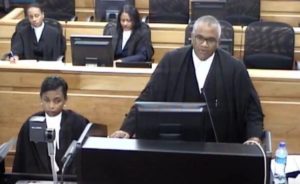
All prisoners serving life sentence in Belize to be re-sentenced following major decision of the Caribbean Court of Justice
- News
- 5 Apr 2018
At least 44 prisoners currently serving life sentences in Belize will be re-sentenced following an important judgment by the Caribbean Court of Justice (CCJ). After considering reforms to the Belize Criminal Code, the CCJ has found that judges have discretion to impose a fixed term sentence for individuals convicted of murder, instead of life imprisonment or the death penalty.
The two appellants in this case, Gregory August and Alwin Gabb, had both initially been sentenced to mandatory life imprisonment without the possibility of parole. This sentence was struck down by the Belize Court of Appeal in November 2016 as “inhuman” and a violation of a right to a fair trial. As a result, the Belize government ushered in legislative reforms to the life sentencing system, modelled on that which operates in the United Kingdom. The new legislation holds that, when sentencing a person to life imprisonment, the judge must impose a minimum term of imprisonment. Once that minimum term has been served, the prisoner becomes eligible to have their case reviewed by a Parole Board for possible early release.
In considering the new legislation, however, the CCJ found that life imprisonment was just one possible punishment for individuals convicted of murder and that a lesser fixed-term sentence could be imposed instead. This means that each prisoner currently serving a sentence of life imprisonment in Belize must now be provided with another sentencing hearing to determine the proportionate punishment in their case.
The CCJ also gave clear guidance on how the parole system should operate, addressing the appellants’ concerns about the independence and impartiality of the Parole Board. The CCJ emphasised that the Parole Board, which contains a number of members of government or ministerial appointments, should act independently from ministerial interests. In addition, the CCJ provided some clarity on the criteria guiding the Parole Board’s decision-making, saying that a prisoner should only continue to be detained after their minimum term is served if they constitute a danger to the public.
In a separate opinion, Mr Justice Adrian Saunders addressed the constitutionality of mandatory life sentences in general. In his opinion, the imposition of a mandatory life sentence amounts to an “encroachment on the judicial function” which is not sufficiently counterbalanced through the possibility of parole. While minimum terms therefore provide some degree of individualisation of sentence, Mr Justice Saunders held that without a judicially determined sentence, they “short-changed” prisoners of their human rights.
A strong dissent was also provided by Mr Justice Jacob Wit on the majority’s decision to reject Gregory August’s appeal against conviction. There had been a catalogue of errors in the criminal investigation, including mishandling of evidence and failure to DNA test crucial blood evidence, suggesting either police incompetence or a possible framing of evidence. In an opinion stretching beyond the specific facts of this case, Mr Justice Wit criticised the “marginal and minimalistic” way in which many criminal investigations are carried out in the Commonwealth Caribbean. Mr Justice Wit would have found the “multitude of weaknesses” in the evidence to render Gregory’s conviction unsafe, maintaining that the appellate court had a duty to be “pro-active” in scrutinising convictions in order to prevent serious miscarriages of justice.
As a result of the judgment Alwin Gabb’s life sentence was vacated and his case remitted back to the Supreme Court for re-sentencing, along with all the other prisoners currently serving life imprisonment for murder. In Gregory August’s case, the CCJ affirmed the sentence of 30 years imprisonment (less time already served) which had been substituted by the Belize Court of Appeal. For Gregory, who has been incarcerated since he was 19 years old, and for all those serving life sentences in Belize, hopes for a life beyond prison are finally a realistic prospect.
Amanda Clift-Matthews, Legal Director of The Death Penalty Project and In-house Counsel, says:
This is a phenomenal and important decision by the Caribbean Court of Justice which affects not just prisoners currently serving life sentences in Belize but future prisoners who may come before the courts. No longer is the judge constrained with a choice between life imprisonment or death. Furthermore, the judgment of Adrian Saunders, which explains why mandatory life sentences are objectionable, is to be commended.
Notes to Editors
The Death Penalty Project assisted Eamon H. Courtenay SC, Anthony Sylvestre and Iliana N. Swift the Belize legal team in this appeal, with the assistance of UK barristers Edward Fitzgerald QC, Doughty Street Chambers, James Guthrie QC and Rowan Pennington-Benton of 3 Hare Court, who acted pro bono, and Amanda Clift-Matthews, In-house Counsel.

















